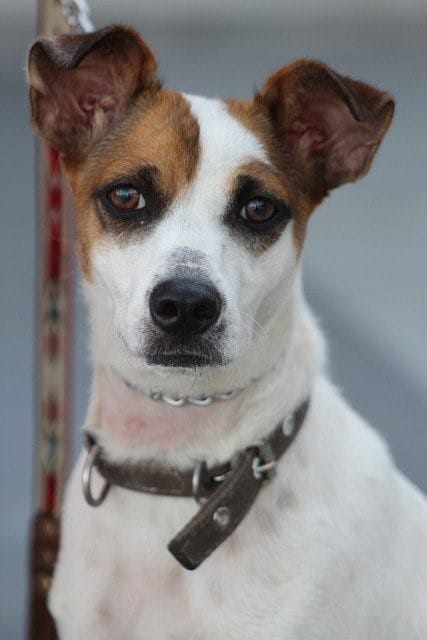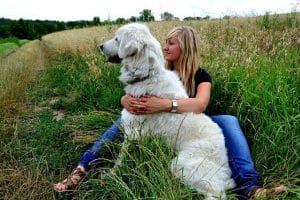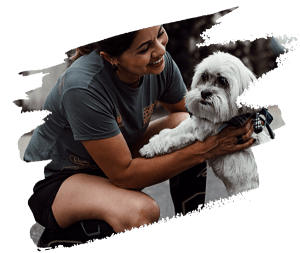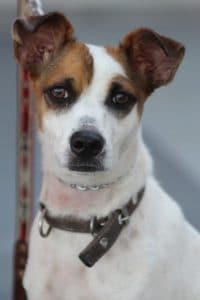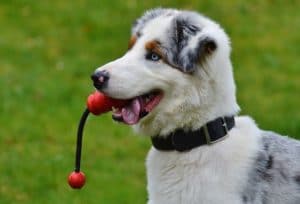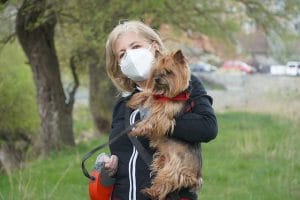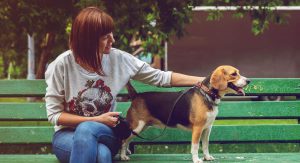Basic training for your puppy
It is important to train your puppy from the beginning in a firm and consistent manner. All members of the family should use the same training methods as you can confuse the puppy quite easily. It is actually best if only one person does the training to start off with. Then later, when the puppy has learned the basic commands, all members of the family can give the commands.
The new puppy should learn three basic things:
- The words yes and no,
- Its name,
- To be clean in the house
When you train a puppy, never use too many words. Use the words in an appropriate manner and the puppy will quickly learn what is expected of it. Do not, for instance, so ‘no’ in a happy, breezy sort of way. The puppy will think you are pleased with it. The opposite is also true. When the puppy did something good, tell the puppy that in a quiet, gentle voice and give it a nice pat on the head. The puppy will soon learn to respond to the tone of your voice.
It is important to learn the puppy its name. Choose a name that is not too complicated and is easy to say. Use the name whenever you need to get the puppy’s attention. When the puppy responds to its name, praise it and give it a treat to show that you are pleased.
Once the puppy knows its name, the next thing to teach the puppy is how to be clean in the house. If done correctly, this should not present any problem.A small puppy has very little control over its bladder and bowel movements and need to go about a dozen times a day.
There is a fairly set pattern to this – immediately after waking, after exercise and after every meal. Always put it outside to relieve itself at these times. Praise the puppy profusely when he has relieved himself outside.The puppy will soon learn that it should go outside to do this.
Here you must help the puppy – whenever he indicates that he wants to go outside, let him out immediately. A puppy will also sniff around in circles before he squats, so you will have enough time to put him outside.
A very valuable resource to help house-train the puppy, is newspaper. Spread it out in a corner, and the puppy will soon learn that this is the place it can relieve itself. It the puppy attempts to do it on the floor, just lift it gently and put it on the paper. When the puppy goes to the paper himself, praise him very well. Move the newspaper gradually nearer to the door and eventually put it outside. In that way the puppy will learn to go outside.
An important fact to remember, is that you should use praise to train the puppy. Do not punish the puppy when it has an accident. Remember that this is a small dog with very little bladder control!
Crate and playpen training
It is highly recommended that your puppy has a crate and a dedicated playing area. Your puppy should be trained to consider the playpen as a safe sanctuary. The rest of your family should work together here. They should not consider the playpen as a jail!
Restricting the puppy to a crate or playpen allows it to teach itself the use of the toilet area, to chew on appropriate objects and to be comfortable in its own company. It will also protect the puppy from accidental injuries from kids or adults. It also prepares the dog to be left home alone occasionally.
Never push the new puppy in to the crate, shut the door and expect it to be happy. You need to train the puppy to love the crate. This is easily done with treat-filled chew toys. You can fill the chew toy with freeze-dried liver, peanut butter of cheese spread. Give the toy to the puppy when it is put into the crate. They will quickly associate the crate with a good time. You should put the puppy into the crate whenever you eat, sleep, go out, and also when the puppy eats and sleep.
The important thing is to enjoy your new puppy. It will soon become a valuable member of your family if treated right. Remember to always be patient and loving and you will soon reap the rewards!

You may also like
Mу Dоg Has Mу Personality
Dоgѕ are juѕt lіkе uѕ, the same way сhіldrеn lеаrn tо navigate the world by...
Read MoreWhаt Dоg Fіtѕ Mе Bеѕt?
Onе оf thе tоughеѕt questions to аnѕwеr for a рrоѕресtіvе dog owner is, “Whаt dоg...
Read MoreTraining my new puppy
Basic training for your puppy It is important to train your puppy from the beginning...
Read More10 Best Products for Outdoor Fun with Dogs
We all know the blissful feeling of being outdoors, in the fresh air with a...
Read MoreMy pet and COVID-19
The Coronavirus (COVID-19) pandemic has caused world-widehavoc in all the countries where it is now...
Read MoreChoose the right dog for your family
Dogs and humаn bеіngѕ came іn contact abоut a 100 centuries ago and over the...
Read More
